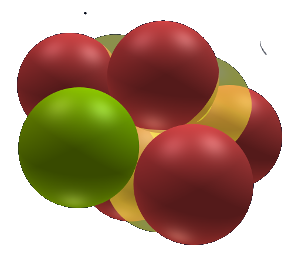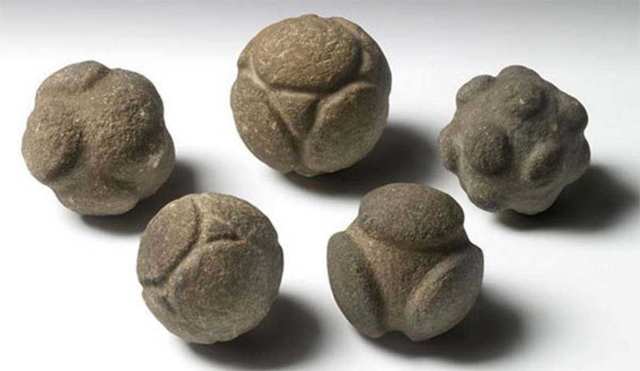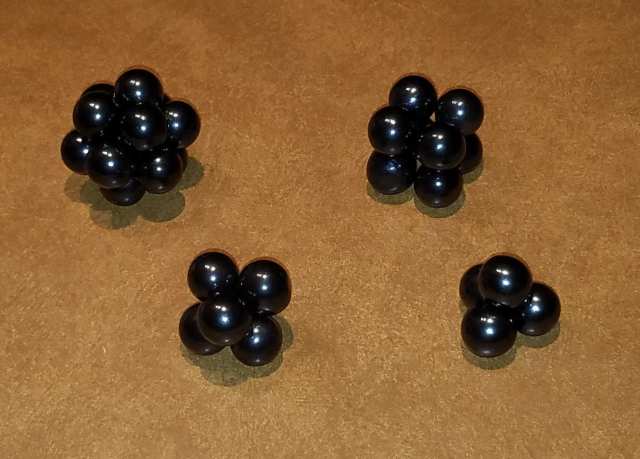A platonic solid is a regular polyhedron where all the faces are identical in shape and size, all the angles are equal, and the vertices lie on a sphere. There are only five possible platonic solids - tetrahedron, hexahedron (cube), octahedron, icosahedron, and dodecahedron.
The platonic solids are unique shapes which are highly symmetrical. Only five platonic solids are possible and they must meet these criteria:
- All vertices lie on a sphere.
- All angles are equal.
- All faces are the same.
- All vertices are surrounded by the same number of faces.
In three-dimensional space, a Platonic solid is a regular, convex polyhedron. It is constructed by congruent (identical in shape and size) regular (all angles equal and all sides equal) polygonal faces with the same number of faces meeting at each vertex. Five solids meet those criteria: Tetrahedron, Hexahedron (Cube), Octahedron, Icosahedron and Dodecahedron. - Wikipedia
Hold down the left mouse button and drag to rotate the solids, center button to zoom, and right button to move the spheres.
Hold down the left mouse button and drag to rotate the solids, center button to zoom, and right button to move the spheres.
| Name | Dual | Face Shape | # Faces | # Vertices | # Edges |
|---|---|---|---|---|---|
| Tetrahedron | Tetrahedron | Triangle | 4 | 4 | 6 |
| Hexahedron - Cube | Octahedron | Square | 6 | 8 | 12 |
| Octahedron | Hexahedron | Triangle | 8 | 6 | 12 |
| Icosahedron | Dodecahedron | Triangle | 20 | 12 | 30 |
| Dodecahedron | Icosahedron | Pentagon | 12 | 20 | 30 |
Duals
Duality is a key principle in everything we observe has a duality - hot and cold, wet and dry, love and hate, positive and negative. We cannot know one without the other
Duality is important in understanding the relationships between the platonic solids.
By the duality principle, for every polyhedron, there exists another polyhedron in which faces and polyhedron vertices occupy complementary locations. This polyhedron is known as the dual, or reciprocal.
Duality is important in understanding the relationships between the platonic solids. The dual for the tetrahedron is itself, another tetrahedron. The dual for the octahedron is the hexahedron (cube). The dual for the icosahedron is the dodecahedron. Notice how the vertice of the inner solid is in the center of the face of the outer solid.
Making the Platonic solids with Spheres
A search on the internet for "Platonic Solids" results in over 600,000 results. You can find all kinds of information about them - how they apply to sacred geometry, the mathematics behind them, the history, artistic recreations. People truly are fascinated with. We know a lot about the Platonic Solids.
However if you search for "Building Platonic Solids with Spheres" (or something similar) you will find virtually nothing that actually matches. A few artists have come close to building all the platonic solids with spheres, but I couldn't find a single one that had all 5 platonic solids built with touching spheres. I find this odd.
When Edo showed me his theory I assumed this knowledge would be common knowledge and I could read all about - no such luck. This is probably the only place on the web you'll find that even mentions it.
Spherical Dense Packing
Dense packing of spheres only works for the 3 platonic solids that have triangular faces - the tetrahedron, octahedron and icosahedron. However the central structure of the octahedron is the square and those spheres are stacked. The octahedron is not stable. The icosahedron and tetrahedron are the only two platonic solids that are stable and not easily broken.
The other two solids, the cube and dodecahedron do not have triangular faces and are not densely packed. The cube has square faces and the spheres are stacked, the structure is easily skewed. The dodecahedron has pentagonal faces which leaves a lot of empty space, it is easily crushed.
Four of the platonic solids can be built with spherical magnets as show to the right - the tetrahedron, cube, octahedron and icosahedron. The dodecahedron cannot, it falls apart.
- Log in to post comments


